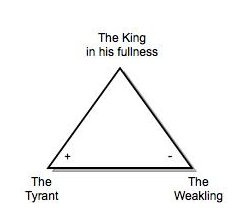I’m always wary of categorizers and cycle-finders: those thinkers who try to discern regular groupings and relationships and patterns in human activity. They always seem to focus on certain events and factors, ignoring those that don’t fit their grand outlines. These outlines seem to be good guides to the near future… until they’re not. I could create a cyclic “model of history” right now:
Thinker creates cyclic model of historical progression
History surprises everyone
(Repeat)
I say this to introduce a caveat to my reference to the book King, Warrior, Magician, Lover (Robert L. Moore & Douglas Gillette). I have never found a scheme of human activity which is compelling enough to make me think it had described (even roughly) the patterns of human activity. In Isaac Asimov’s amazing novel Foundation (which incorporates political science and philosophy better than any novel I’ve read, save perhaps Starship Troopers) the mathematician Hari Seldon develops his theory of psychohistory and uses it to predict the impending fragmentation of his interstellar civilization. I don’t think anyone has done anything similar in human affairs… that is my point here. Even those pattern-finders and statisticians who avoid grand theories and focus on recent historical trends and basic human incentives (like Peter Zeihan) will be wrong as often as right. There are simply too many variables involved for any model to maintain its logical integrity.
Nevertheless, certain elements of civilizations or the human psyche can be grouped and generalized and even given fanciful names without doing too much violence to the data. That is what King, Warrior, Magician, Lover seems to have achieved. I’ve only read half of the book but I will focus on the Magician Archetype here. According to the book we live in an age driven by the magician archetype, and I must agree. It uses Jungian concepts of psychic archetype and a Hegelian dialectic of tension and personal growth. This is the diagram for the ‘King’ archetype, for example:
Hegel created the ‘dialectic’: a model of eternal change (until the end of history) in which the thesis (factor, motivation, group, incentive, etc.) would push against and struggle with a different (usually opposite) force-the antithesis-and their struggle would yield the synthesis… which would become the thesis and so on. The Jungian archetypes in the book are all arranged in the triangular scheme above, with a young form and a shadow form. By wrestling with the challenges and fears of each a man can achieve the fullness of the archetype and therefore actualize on an individual and social level. The influence is obvious, although here it is not the movement of history being described but the path of personal psychological growth for men.
The magician archetype is broken into two components (not the struggle between the two poles of the archetype, as shown above but two elements that comprise it in its shadow and developed form):
The master of technology - is knowledgeable about all the tools and procedures which have been devised to change and measure nature and material reality.
The knower - is cognizant of his internal composition and the interactions with the spiritual forces of the world. As shamans of cultures for thousands of years have known, a seeker can explore the outer realms of the universe or delve deep into his subconscious… and find the same ‘truths’ about reality. Knowing one’s own mind truly is the greatest task for a human being.
As masters of technology our civilization excels. As knowers of our own minds (despite our considerable resources devoted to therapy and psychology) we are-I believe-probably the feeblest culture which has ever existed. I am studying the ritual of the Sacred Mysteries of Eleusis right now, and will write something about that soon, but I am hopeful that our civilization will repair its rending collective psyche. There are glimmers of hope: a widespread understanding that the self-centered and reward-driven models of many types of therapy are intellectually bankrupt; the rise of Dr. Jordan Peterson (himself a profound devotee of Dr. Carl Jung who regularly refers to Jungian archetypes) and his message of personal growth and challenge; the quickly-advancing modern institutional engagement with psychedelics (still reserved for medical and research purposes, but even in those contexts these forces have the potential to completely rejuvenate our civilization).
The Temple of Demeter, in Athens, a key site for the ritual of the Eleusinian Mysteries, a secret and once-in-a-lifetime spiritual voyage which changed focever the minds of Marcus Aurelius, Cicero, Plato, and thousands more. Its origin reaches back past the iron age… perhaps 10,000 B.C., or earlier.
I think that in 2024 I must achieve a much deeper level of spiritual growth and begin to build out my relationship with God to avoid disaster. I had achieved much the same realization at the beginning of 2023 and I believe that I was successful, if only just.
So I may be projecting here but I think that a similar claim could be made for the whole of Western civilization: either we renew our deepest values and turn back toward family and accomplishment and virtue, or great suffering awaits us. We need a science of virtue and fulfillment and social health which we completely lack at this time. The United States needs a New Year’s resolution… but I will let you imagine what that might be.






